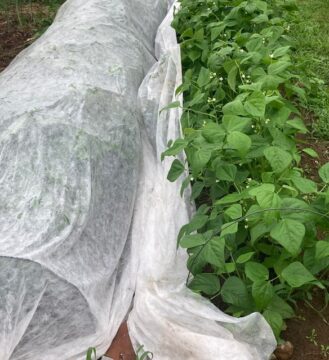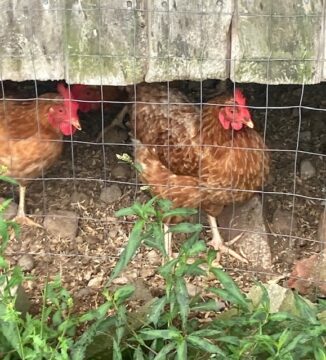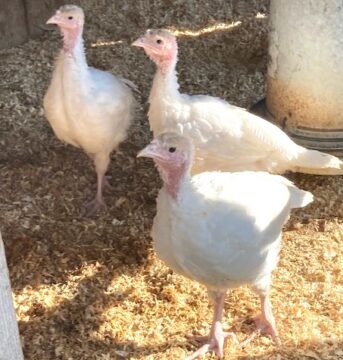by Mike Bendzela
Today is a bit of an experiment. I take the row covers off of two forty-foot rows of beans (three varieties) as the plants have become so big so fast in the ungodly heat they are pressing against the cloth. Afterwards, in the early evening, I let the chickens out of their sweltering little house to run free for a couple of hours. I will watch them to see if they bother the plants. The birds might peck at and scratch up the bean plants, but these plants are so large the birds should be indifferent to them. The experiment is a success: The plants bask in full sunlight while the birds rummage for grubs around them. I decide to leave the row covers off for now and will recover them at night to deter the deer. One’s smallness is manifested in gardening, as the gardener is a single organism set against myriads. It is wise to tend to one’s insignificance during these times. Come what may, no one will care much about those who stay at home husbanding rows of Maxibel haricots.
I take the row covers off of two forty-foot rows of beans (three varieties) as the plants have become so big so fast in the ungodly heat they are pressing against the cloth. Afterwards, in the early evening, I let the chickens out of their sweltering little house to run free for a couple of hours. I will watch them to see if they bother the plants. The birds might peck at and scratch up the bean plants, but these plants are so large the birds should be indifferent to them. The experiment is a success: The plants bask in full sunlight while the birds rummage for grubs around them. I decide to leave the row covers off for now and will recover them at night to deter the deer. One’s smallness is manifested in gardening, as the gardener is a single organism set against myriads. It is wise to tend to one’s insignificance during these times. Come what may, no one will care much about those who stay at home husbanding rows of Maxibel haricots.
*
With the row covers off, I can spend a sweaty half-hour or so weeding the thick crab grasses, galinsoga, and lamb’s quarters growing between the rows. Some of these are introduced plants, meaning the garden is a symbol of human perturbation of the biosphere in more ways than one. You must take care to grasp the weeds down low to remove whole plants from the soil because plants break off easily near the root, and you don’t want the weeds regrowing from the remaining root mass. This is especially troublesome with the grasses, which feature thick root mats. An evolutionary adaptation is at work here: Had prehistoric grazing ruminants been able to pull whole plants out of the ground with their teeth, that would have spelled the end of that plant variety. Grass varieties with regenerative stems and rugged roots survived grazing, persisted, and thus multiplied. For millions of years during the Miocene Epoch, grasses outwitted the horsey lips of Parahippus and the like. In the garden, I just have to stay ahead of them. They will outwit me if I get lazy, so it is a battle that never ends. Like dealing with contemporary stressors, patience and tenacity are key.
*
Galinsoga is a plain-Jane weed that can sort of imitate the crop it is plaguing, thus evading detection. As you weed, it will suddenly appear near a plant like an afterthought: Say what? Crab grasses always look like crab grasses, but they can hide between plants and crowd out the very stems of the crop plant. You push aside a bean plant, find grass, and say, I thought so! Lamb’s quarters, with its spike of goose-foot-shaped leaves, stands out insolently, like thought-deadening slogans. You rip out whole plants, one by one, but it takes time. Your reward will be a year’s worth of glass jars full of pressure-canned green and wax beans. Now is a good time to focus on securing the things you set store by.
*
The chickens are chuckling all around me as I weed between the rows. I hear them scratching and shuffling through leaf mold mulch in the under-story of the nearby asparagus which have begun to spread their ferns. These chickens, Golden Comets, have had much of their flightiness bred out of them: you can walk right up to some of them, who go into lordosis, a sort of “squatting” to prepare for mounting, and you can pick them up off the ground. The chuckling and scratching is truly ancient behavior that goes back to the prehistoric junglefowls of Southeast Asia, and perhaps even further to the theropods of the Jurassic. Egg-by-egg, these traits were passed down for tens of millions of years. Take that, Homo colossus.† Even your ziggurats come to dust.
*
 It’s entertaining to think about how people think they know things. They don’t realize they are simply repeating what they have seen on television and websites, all framed and packaged according to the dictates of money and power, who continually tell us what thoughts are worth thinking about. These outlets dole out opinions about Issues X and Y, like grain to chickens, and then the same outlets turn around and conduct “polls” of what people think about Issues X and Y. All the while, the outlets feign objectivity, pretending that they are not the very wheel upon which all opinions turn. And it’s all done for the benefit of advertisers. There is a striking inanity to it all. I have not quite figured out yet how I know that I know something, or whether I’m just another mark repeating someone else’s thoughts. Except that a lot of the things other people think are just bonkers.
It’s entertaining to think about how people think they know things. They don’t realize they are simply repeating what they have seen on television and websites, all framed and packaged according to the dictates of money and power, who continually tell us what thoughts are worth thinking about. These outlets dole out opinions about Issues X and Y, like grain to chickens, and then the same outlets turn around and conduct “polls” of what people think about Issues X and Y. All the while, the outlets feign objectivity, pretending that they are not the very wheel upon which all opinions turn. And it’s all done for the benefit of advertisers. There is a striking inanity to it all. I have not quite figured out yet how I know that I know something, or whether I’m just another mark repeating someone else’s thoughts. Except that a lot of the things other people think are just bonkers.
*
Who told them human-caused climate change is a hoax? Who told them a national election was stolen in plain sight? Who told them weedkillers cause cancer? Who told them only “organic” food is safe? Who told them the two sexes are as interchangeable as socks? Who told them wind turbine towers and solar panel installations are “green”? Who told them vaccines kill? Who told them race is a “social construct”? Who told them homosexuality is caused by bad parenting? Who told them life begins at conception? Who planted “false flag” in their heads? Who planted “the invisible hand of the market”? Who sowed the idea of perpetual growth on a finite planet? Who told them modern civilization can run without fossil fuels? And where did they get the idea that the opinions of TV stars, sports icons, and pop singers are important? Sometimes the whole world seems like a weed bank.
*
And yet, even your own notions can seem quite weird when you think about them. For example, whence comes the idea that your rows of beans are important? Who told you some thoughts are like weeds? Who told you the growth habits of grasses were directed by extinct horses’ lips? Who told you chickens cluck like dinosaurs? Who planted the notion in your head that some apes in Africa began chattering two million years ago and that these apes are your relatives? Who gave you the idea that once enough of these apes believed this chattering was meaningful, they began chattering new entities into existence, things like language, and coalitions, and Oldowan stone tools? They chattered the idea that they could dismember the abundant megafauna around them with these tools in order to thrive, and thus the hunt was on. They further chattered into existence handsome Acheulean tools, which they learned to dismember each other with. They chattered this knowledge down the ages for over a million years, until the mayhem spanned continents. Such are the things you think about between bean rows.
*

After I finish weeding the beans, I decide to let our four turkey poults out of their quarters to run in the chickens’ yard. They have been peeping desperately to be set free like the chickens, and it is very hot in their house. They can mingle a while with the other birds and become part of the flock, but I will have to collect them in the evening: Unlike chickens, turkeys are not very good about returning to their quarters and will duck in the underbrush somewhere for the night until a hungry mammal finds them. The turkeys have been off my mind for about an hour, when a neighbor, who walks his daughter daily in her carriage and likes to show her the chickens, comes into the driveway and tells me one of the turkeys is dying from the heat. We go up to the poultry houses together and find a turkey poult collapsed and panting in the dust, its eyes lidded. There is plenty of water in the birds’ font. I pluck the turkey poult off the ground and find that feathers have been picked off its back and its head is purple with sores. These are signs of a fight: The Golden Comet hens have attacked the baby turkey. The other three turkeys are cowering under the house. I gather them all up and put them back in their house to recover from the trauma of the attack. Like the scratching and chuckling, the instinct to establish a pecking order hasn’t been bred out of these birds. The stupider the politics, the bigger the brawl.
*
Who actually remembers those horrific wall-scaling scenes at warring Mycenae, the skull cults near the monoliths at Göbekli Tepe, or the territorial disputes in prehistoric Turkana arbitrated by obsidian blades? No one does. It all passes like the seasons. Human institutions cannot defy gravity, and the flight to the bottom looks inevitable. The chambers of power and wealth will always attract sociopaths and fanatics, leading to a world where everyone else seems to know what’s best for you. Enjoy the relief of knowing there’s little you can do about it. The salve: Stay at home, turn your back to the noise, and grow something edible.
(As of this writing, the baby turkey has fully recovered.)
***
†Homo colossus is American sociologist William R. Catton Jr.’s term for modern humans and their inordinate needs.
_________________________
Images
Photographs by the author.
Enjoying the content on 3QD? Help keep us going by donating now.
